Be sentenced to life! A man contracted eight community hospitals and defrauded medical insurance of more than 100 million yuan.
Xinhua Street Community Health Service Station is located near West Fourth Ring South Road, Fengtai District, Beijing. The sign is eye-catching, but the glass door is locked. There is a sign at the door, which says that outpatient service is suspended.
It was a day in January, 2024. People came and went in front of this community health service station. Occasionally, someone went to the door to look at it, saying that they had come to take medicine to see a doctor. Unexpectedly, it was closed. A lady who lives nearby told China Newsweek that this service station has been closed for several years. "There are all kinds of things to say now, and some say that the boss owes money to run away; Some say that this service station belongs to private contracting, and now private contracting is not allowed. "
According to China News Weekly, this community hospital is indeed contracted by individuals. The contractor’s name is Li Penghui. In July 2020, Li Penghui was arrested on suspicion of committing fraud. In addition to this community hospital, Li Penghui also contracted seven other community hospitals in Fengtai District, Beijing.
On December 29th, 2023, the Beijing No.2 Intermediate People’s Court (hereinafter referred to as "Beijing No.2 Intermediate People’s Court") pronounced in the first instance that Li Penghui was convicted of fraud and sentenced to life imprisonment, and at the same time committed the crime of embezzlement, the crime of accepting bribes by non-state staff, and the crime of falsely invoicing, and decided to execute life imprisonment.
The court found that Li Penghui used eight community hospitals, including Xinhua Street Community Health Service Station, which he contracted, to collude with others to defraud the national medical insurance fund of more than 100 million yuan.
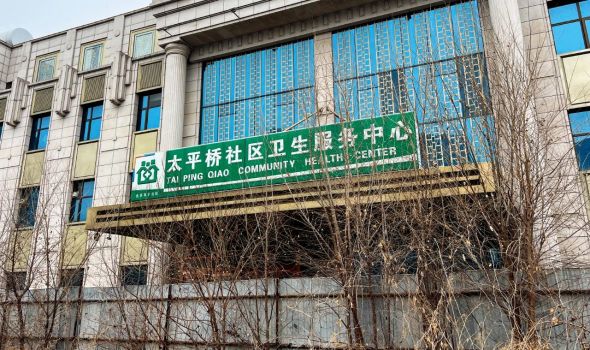
The Taiping Bridge Community Health Service Center contracted by Li Penghui has now closed. Photography/Our reporter Liu Xiangnan
Defrauding medical insurance funds by more than 100 million yuan
Before the incident, Li Penghui was a legal person of Beijing Jingminkang Investment Management Co., Ltd. (hereinafter referred to as "Jingminkang Company"). On July 29th, 2020, he was detained by Fengtai Branch of Beijing Public Security Bureau and arrested on September 4th of the same year.
Also in the same case as Li Penghui are Fan Zongtang, Fan Wenyuan and Li Peirong. Before the incident, Fan Zongtang was the actual controller of Beijing Nengji Chinese Herbal Pieces Co., Ltd. (hereinafter referred to as "Nengji Company"), Fan Wenyuan was the supervisor of Nengji Company, and Li Peirong was the financial controller of Jingminkang Company. They were both detained and arrested on the same day as Li Penghui.
After the investigation of Li Penghui by Fengtai Branch of Beijing Municipal Public Security Bureau, it was transferred to Fengtai District People’s Procuratorate of Beijing for examination and prosecution, and Fengtai District Procuratorate submitted the case to the Second Branch of Beijing People’s Procuratorate for examination and prosecution. In October 2021, the Second Branch of Beijing Municipal People’s Procuratorate filed a public prosecution with Beijing No.2 Intermediate People’s Court. Regarding the part of Li Penghui suspected of fraud, the procuratorate found out the following facts:
From 2015 to 2020, four people, including Li Penghui and Fan Zongtang, conspired to illegally obtain national medical insurance funds. First, Li Penghui and Li Peirong instructed their employees Wang Mopeng and others (both handled separately) to purchase raw materials of traditional Chinese medicine privately or buy finished pieces of traditional Chinese medicine for Nengji Company, and then Fan Zongtang and Fan Wenyuan instructed their employees Chen Xiangcheng and others (both handled separately) to forge raw material inspection reports and production records and print medicines. It was sold to eight community health service stations (centers) such as Xinhua Street Community Health Service Station controlled by Li Penghui, and then these eight community health service stations (centers) defrauded the national medical insurance funds by claiming reimbursement.
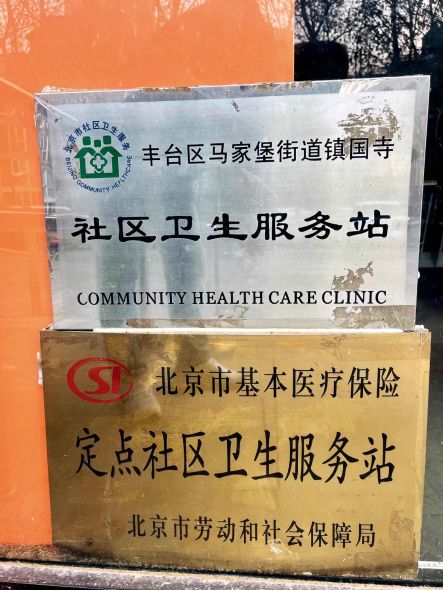
The eight community hospitals contracted by Li Penghui are all designated medical insurance institutions. Photography/Our reporter Liu Xiangnan
From 2015 to 2020, four people, including Li Penghui, conspired to illegally obtain national medical insurance funds. During the process of purchasing and selling Chinese herbal pieces from Nengji Company in eight community health service stations (centers) controlled by Li Penghui, they instructed their employees to issue sales bills with two prices, conceal and inflate the actual purchase price and sales price of drugs, and declare reimbursement, thus defrauding the national medical insurance funds of more than 43 million yuan.
The eight community hospitals contracted by Li Penghui are located in Fengtai District, Beijing, including seven community health service stations including Xinhua Street, Zhenguo Temple, Liuliqiao Nanli, Chengnan Jiayuan, Fengti Times, Wangyuan and Indigo New District, and Taipingqiao Community Health Service Center.
Li Penghui was born in December 1973, and his domicile is Huaibin County, Xinyang City, Henan Province. Li Penghui’s father, Li Peiri, said that after graduating from high school, Li Penghui went to Shijiazhuang to study medicine, and then went to Beijing to develop as a dermatologist and open a clinic. Relevant legal documents show that Li Penghui has a college education.
According to Li Penghui’s confession, in 2014, he established Jingminkang Company to facilitate the management of the eight community hospitals he has contracted. These eight community hospitals belong to private non-enterprise units in nature, and are not allowed to engage in profit-making activities, and the surplus is not allowed to pay dividends, and they are all designated medical institutions for medical insurance. They all signed a trust agreement with Jingminkang Company to trust the management of people and property to Jingminkang Company.
According to the industrial and commercial information, Jingminkang Company has a registered capital of 20 million yuan, which is an enterprise mainly engaged in business services, and Li Penghui holds 100% of the shares. At present, the company still exists, but it has been listed as a restricted high-consumption enterprise by the court.
In the case of Li Penghui, another defendant, Li Peirong, was Li Penghui’s aunt and was born in 1963. Li Peiri said that he has nine brothers and sisters, and Li Peirong ranks in Laojiu. Li Peirong studied in high school, worked as a director of women in her hometown, and later came to Beijing to be in charge of finance in her nephew’s company. Among the relatives of the Li family, Wang Mopeng, the brother-in-law of Li Penghui, was arrested for the case. Wang Mopeng works as a purchasing manager in Jingminkang Company.
Fan Zongtang, the actual controller of Nengji Company, is the No.2 defendant, born in 1962, and his domicile is Bozhou, Anhui, a famous "drug capital". Another defendant, Fan Wenyuan, is the son of Fan Zongtang. According to the industrial and commercial information, Nengji Company was established in 2013 with a registered capital of 20 million yuan, which is mainly engaged in pharmaceutical manufacturing. Now the company has changed its alias and moved to a new address.
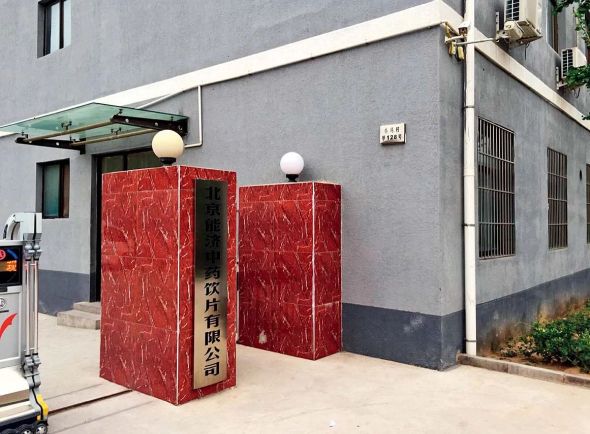
(Profile picture) The former Nengji Company located in Fangshan District of Beijing has been demolished.
Fan Zongtang’s wife Kang Huaying said that their hometown was in the suburb of Bozhou, Anhui Province. At the end of 1985, Fan Zongtang came to Beijing to do business, ran some clinics or hospitals, and sold the locally grown Chinese herbal medicines purchased in Bozhou to these clinics or hospitals. In 2008, Fan Zongtang rented land in Xiaoma Village, Qinglong Lake Town, Fangshan District, Beijing to build a factory for producing Chinese herbal medicines, named Beijing Shenghuitang Chinese Herbal Pieces Co., Ltd. In 2013, he rented another land in Xiaoma Village to build a new factory, namely Nengji Company.
The so-called decoction pieces of traditional Chinese medicine refer to the traditional Chinese medicine that can be directly used in the clinical practice of traditional Chinese medicine after being processed according to the theory and processing methods of traditional Chinese medicine. Fan Zongtang’s family revealed that the Chinese herbal medicines of Nengji Company were mainly purchased from Bozhou, Anhui Province, processed into Chinese medicine, and then supplied to many hospitals in Beijing. By the time Fan Zongtang and his son were arrested, Nengji Company had more than 70 hospitals in Beijing, including more than 40 community hospitals.
Fan Zongtang and Kang Huaying have three sons, among whom Fan Wenyuan was born in 1988, ranking second; The eldest brother named Fan Jinghui, born in 1985, was also arrested on the same day as Fan Zongtang and was dealt with separately. From 2018 to the incident, Fan Jinghui served as a legal person of Nengji Company. Kang Huaying was responsible for purchasing Chinese herbal medicines in Bozhou. She was also arrested on the same day as Fan Zongtang, and was not prosecuted.
"Special" Chinese Herbal Medicine in Pharmaceutical Factory
The case of Li Penghui was tried in Beijing No.2 Intermediate People’s Court for three days. According to the first-instance judgment made by Beijing No.2 Intermediate People’s Court, the trial of Li Penghui and others for fraud involved the testimony of more than 40 witnesses.
Hong Xu is Li Penghui’s cousin. He testified that in July, 2016, Li Penghui asked him to help Jingminkang Company, and his job was to distribute and carry goods in the pharmaceutical factory of Nengji Company. Around July 2020, Li Penghui asked him to go to Anguo, Hebei Province to buy Chinese herbal medicines with Wang Mopeng, who was in charge of purchasing in Jingminkang Company. They sent the bought herbs to Nengji Pharmaceutical Factory for processing and labeling, and then distributed them to community health service stations.
Hong Xu said that the price of the medicine they bought from Anguojin was very low, and the ex-factory price was the same as that of the medicine produced by Nengji Company, so his company could earn more difference. Moreover, the drugs are all drugs that can be reimbursed by medical insurance, and the drugs are not taken at their own expense, and these drugs are only sold to Jingminkang’s own health service station.
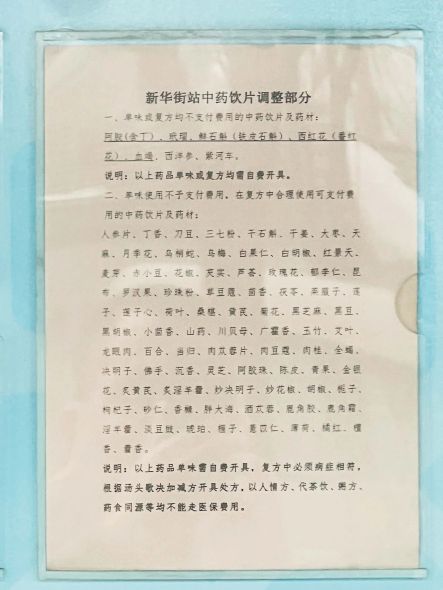
Notice materials about "Chinese herbal pieces" posted in a community hospital contracted by Li Penghui.
A number of employees who have done testing work in Nengji Company have testified that Wang Mopeng’s testing data of medicinal materials were falsified. Sun Ya, who went to work in the inspection team of the quality department of Nengji Company in March 2014, said that Wang Mopeng’s goods stored in Nengji Company included both raw materials and finished products. Wang’s goods were different from those of Nengji Company, and they were stored separately. Wang’s goods often had problems, and the factory had to leave Wang’s goods, so he was asked to falsify the data and change the inspection report. He also revised the origin and quantity of raw materials in the inspection report, because some raw materials in the origin are better, more famous and more expensive. An employee also testified that during the purchase, production and sales of Nengji Company, he found that Wang Mopeng’s goods were special. Other hospitals bought finished products from Nengji Company, but Wang Mopeng purchased the goods himself and stored and processed them in Nengji Company.
Fan Jinghui, who served as a legal person in Nengji Company, confessed that Nengji Company is mainly engaged in the production, processing and sales of Chinese herbal medicines, and its business scope is not allowed to buy finished Chinese herbal pieces, nor can it distribute finished Chinese herbal pieces of other brands. Most of the raw materials of Chinese herbal medicines of Nengji Company were collected by his mother Kang Huaying’s company from Bozhou medicinal materials market in Anhui Province, and some of them were imported from Anguojin, Hebei Province, which was purchased by Wang Mopeng on behalf of Li Penghui.
Most of the Chinese herbal pieces in eight community hospitals managed by Jingminkang Company are taken from Nengji Company. Fan Jinghui said that Wang Mopeng will give Nengji Company a procurement plan, and Nengji Company will start processing raw materials according to the types of this plan. Wang Mopeng’s finished products and raw materials of Chinese herbal medicines purchased from Anguo are stored separately in Nengji Company, and Wang Mopeng’s finished products can directly enter the warehouse of Nengji Company because Fan Zongtang and Li Penghui agreed before.
After Wang Mopeng’s raw materials enter Nengji Pharmaceutical Factory, the quality inspection department carries out quality inspection, and sometimes the results of quality inspection will be unqualified. In this case, Fan Jinghui will ask the inspector to re-examine and adjust the detection method until Wang Mopeng’s medicine is qualified; If it can’t pass, Fan Jinghui will contact a third-party inspection agency. According to the confession of Fan Jinghui’s younger brother Fan Wenyuan, if it is tested by a third party, it will basically be qualified.
Fan Jinghui confessed that during the testing process, he also asked the personnel of the quality inspection department to change the testing data. After the raw materials are processed, the employees in the production workshop will package Wang Mopeng’s medicine and affix the label of Nengji Company. The part of the finished product that Wang Mopeng entered Nengji Company did not have the test report of Chinese herbal medicine raw materials when he came, and Nengji Company helped to do the quality test report. In addition, it is necessary to write production records from Chinese herbal medicine raw materials to finished products, so he arranged for the staff of the production department to supplement the production records of Wang’s medicine.
Chen Xiangcheng, who is the head of the supply and marketing department in Nengji Company, confessed that the quality of Wang Mopeng’s goods is poor, and most of them are finished products. The goods with the trademark of Nengji Company must have a full set of production records, and Nengji Company will arrange people to make fake production records. The finished medicinal materials purchased by Wang Mopeng are directly packaged by the production department, and only a few need to be packaged after simple processing, and the production batch number is compiled.
The witness refers to "circular insurance fraud"
In January, 2024, China News Weekly visited eight community hospitals contracted by Li Penghui in Fengtai District, Beijing. Except for two community health service stations in Liuliqiao Nanli and Fengti Times, the other six have stopped operating. Chengnan Jiayuan Community Health Service Station on Majiapu Road no longer exists. Its original site now runs a car maintenance shop. A clerk said that this car maintenance shop has been open for two years, and there are still two red characters "medical insurance" on the top of the shop.
Although many of them have closed, the layout at that time can still be seen from the remaining furnishings. Walking into the community health service stations of Nanli and Fengti Times in Liuliqiao, which are still being treated, we can see that both community hospitals have specially set up "Chinese Medicine Pavilion" to promote Chinese medicine experts and Chinese medicine featured therapies such as scraping, massage, acupuncture and massage. On one side of the Zhenguo Temple Community Health Service Station, there is only a Cantonese restaurant. This community hospital has also set up a special "Zhenguo Temple Chinese Medicine Department", and the green characters of "Zhenguo Temple Chinese Medicine Department" are the same size as those of "Zhenguo Temple Community Health Service Station". Looking through the window glass of Xinhua Street Community Health Service Station, we can see that there is a slogan "Let you enjoy high-quality Chinese medicine service at your doorstep" on its publicity column, and an introduction to several Chinese medicine experts and a notice on "Adjustment of Chinese medicine decoction pieces" are posted.
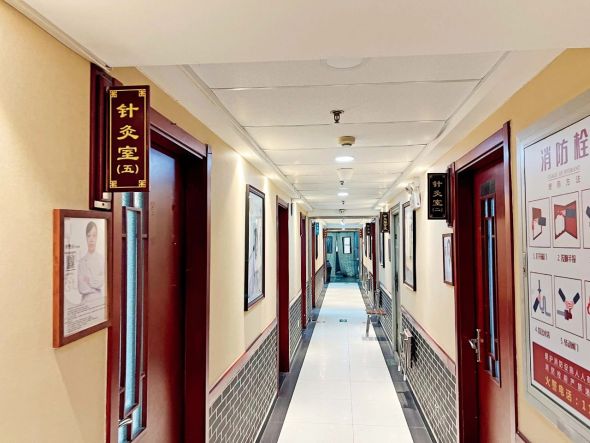
A corner inside a community hospital contracted by Li Penghui. This edition of photography/our reporter Liu Xiangnan
According to Li Penghui’s confession, the Chinese herbal medicines in the eight community hospitals he runs are mainly imported from Nengji Company, and Fan Zongtang of Nengji Company promised to give them rebates. The money was first paid to Li Peirong’s account in charge of finance in Jingminkang Company, and then Li Peirong gave it to him. Each health service station (center) is independently accounted for and settled with Nengji Company respectively. The finance department of Jingminkang Company is mainly responsible for supervising these health service stations (centers).
Fan Zongtang confessed that he was introduced to Li Penghui. Li Penghui told him that several of his community health service stations bought Chinese herbal pieces from Nengji Company, and the amount was large, and the price was lower. He also offered a rebate. Li Penghui agreed with him that after the supply was completed, 15% ~ 20% of the transaction amount would be used as a rebate. In addition, Li Penghui bought some Chinese herbal medicines and sold them to Nengji Company, and Li earned some money. After being processed by Nengji Company, they were sold to Li Penghui’s community health service station. Because the medicines bought by Li Penghui were of low quality, these medicines could only be sold to Li Penghui’s own community health service station.
In the view of Fan Wenyuan, the son of Fan Zongtang, their cooperation with Li Penghui at the beginning was to make money. They felt a little illegal and risky, but they didn’t realize that there would be such serious consequences, so they went all the way to the crime.
Fan Wenyuan confessed that from the sales bills, we can distinguish the drugs of Nengji Company from those purchased by Wang Mopeng. First, the varieties are different. There are many kinds of drugs purchased from Nengji Company, but the number of each variety is small. Wang Mopeng purchased and processed drugs on his own behalf, but the number required is large; Second, from the point of view of discount rate, Nengji Company issued two tickets for its own medicine, one with discount rate was actually used to settle accounts with Wang Mopeng, and the other without discount rate was used to settle accounts with community health service stations. Wang Mopeng only had one ticket for the medicine he bought himself, and there was no discount rate. There must be two kinds of bills recorded by Nengji Company, one is tickets sold to eight community health service stations at low prices, and the other is bills purchased by Li Penghui himself.
Invoicing in this way, in the later judgment, was recognized by the court as a way for Li Penghui and Fan Zongtang to conspire to defraud the medical insurance fund. In this regard, Fan Jinghui also mentioned it in his confession. According to Fan Jinghui’s confession, Wang Mopeng ordered the goods from Nengji Company, and according to the ordering plan, priority was given to stocking the goods from Wang Mopeng’s own goods in Nengji Company, and the insufficient or no drugs were stocked from Nengji Company’s own finished goods. The billing office of Nengji Company will issue the accompanying bill separately, in which the accompanying bill of Wang Mopeng’s own goods will be sent away directly with the goods, and the person in the billing office will first issue a high-priced accompanying bill, and then issue a low-priced accompanying bill according to the lower price finalized by Fan Zongtang and others. This kind of change in unit price to issue high and low bills has been around since the end of 2017. The total amount of high-priced tickets minus the total amount of low-priced tickets is the profit of drugs that Li Penghui’s eight health service stations bought from Nengji Company, and their checkout is based on high-priced tickets.
Dong Mengmeng once worked as a cashier in Jingminkang Company. She testified and recalled that there are two kinds of Chinese herbal medicines used in various community health service stations controlled by Li Penghui, one is Nengji wholesale, and the other is Wang Mopeng wholesale, which is also called self-use wholesale. Private purchase of Chinese herbal medicines is a private communication between Li Penghui and the boss of Nengji Company. By reducing the cost of medicine and raising the price of medicine, the profit is maximized. There are differences in the quality and registration methods between Nengji wholesale and self-use wholesale. Nengji wholesale belongs to the regular pharmaceutical factory, and the self-use wholesale is the medicine that Wang Mopeng bought from outside, and the quality is not good. Dong Mengmeng said that Wang Mopeng bought low-priced drugs for Nengji Company, and then sold them to various community health service stations at the national standard price with the trademark of Nengji Company. Each community health service station was purchased with the medical insurance fund of the public account.
Throughout the case of Li Penghui, witness testimony directly mentioned the medical insurance fund, except Dong Mengmeng, and Zhang Hengxing, the accountant of Jingminkang Company. Zhang Hengxing testified: "The service station paid Nengji Company according to the accounting standard, using the medical insurance funds in the service station’s corporate account, and Nengji Company returned the wholesale money for its own use to Li Penghui and his designated personal account, and then Li Peirong took the money and gave it to Wang Mopeng to continue to buy cheap Chinese herbal medicines in Anguo."
"This is the cycle," Rolling Xing said. "This is a kind of deception, and it is the money from the medical insurance fund that is defrauded."
Judgment of first instance: the principal offender was sentenced to life imprisonment.
Community health service station is an important part of social public health service management, which plays an important role in the health service in China, but there are also problems. In October, 2021, the Supreme People’s Court reported seven typical cases of punishing medical insurance fraud according to law. One case was that a community health service station in Beijing defrauded more than 30 million yuan of national medical insurance funds by falsely prescribing drugs, and its legal person was sentenced to life imprisonment.
As for the case of Li Penghui, China News Weekly learned that it was the national medical insurance department that received the report and complaint, and then transferred the clue that "eight community health service stations were suspected of colluding with suppliers to falsely invoice and defraud the medical insurance fund" to the Beijing medical insurance department, which led to the case.
According to the judgment of the first instance, the Beijing Municipal Health Insurance Bureau issued a reply to prove that the actual payment amount of the Chinese herbal medicine medical insurance fund from the eight community hospitals involved in Li Penghui’s case from January 2015 to April 2020 (including the Wangyuan Community Health Service Station from May 2019) was 242,419,570.12 yuan, accounting for 81.28% of the total amount in all medical insurance transactions including Chinese herbal medicine project fees. The judicial audit report and the basic audit data on which it is based prove that from January 2015 to October 2019, of the amount of Chinese herbal pieces purchased from Nengji Company by eight community health service stations involved, the total amount of self-use wholesale (self-collected part) was 124,951,045.69 yuan, the total amount of Nengji wholesale was 90,643,353 yuan, and the total amount of Nengji delivery was 46,908,133.3 yuan; The related payment amount of Chinese herbal medicines collected by 8 community health service stations involved is 55981013.84 yuan.
During the trial, Li Penghui did not recognize the alleged crimes. For the crime of fraud, he argued that the raw materials of traditional Chinese medicine purchased by himself were of good quality and low price, and the drug price was reasonable after being processed and supplied to community hospitals by Nengji Company, and the price was not inflated. He never colluded with Fan Zongtang to defraud the medical insurance fund by means of high and low fares. His defender issued a defense opinion, arguing that Li Zicai’s medicinal materials are commercial operations, and low-price procurement and high-price sales are also market operations. No quality problems have been found in the above medicinal materials, and the sales prices of all links are in line with legal provisions and market conditions; Regarding the drug supply part of Nengji Company, the procurement, sales and declaration processes of health service stations are all legal, and the difference between high and low tickets is actually a kickback. In both modes, Li Penghui did not commit fraudulent acts such as fabricating facts, concealing the truth, maliciously colluding, and inflating drug prices, and the Medical Insurance Bureau did not have a wrong understanding. Li Penghui did not constitute fraud.
Regarding the fraud crimes of Li Penghui and others, the court judged that: objectively, Li Penghui, Fan Zongtang and others made up facts and concealed the truth; The evidence in the case can prove that the defendants cooperated with each other, fabricated the actual purchase price of Chinese herbal pieces, concealed the true basic data, and defrauded the medical insurance funds; Subjectively, each defendant has the intention of fraud and the purpose of illegal possession; The defendant’s defense and defense opinions that do not constitute fraud cannot be established, and the court will not accept them.
On December 29, 2023, Beijing No.2 Intermediate People’s Court pronounced: Li Penghui committed the crime of fraud, the crime of occupation, the crime of accepting bribes by non-state staff, and the crime of falsely issuing invoices, and decided to execute life imprisonment and confiscate all personal property; Fan Zongtang committed fraud and bribed non-state staff and decided to execute 15 years in prison; Li Peirong committed the crime of fraud and duty embezzlement and decided to execute a fixed-term imprisonment of 15 years; Fan Wenyuan was convicted of fraud, bribery of non-state staff and forging the seal of the armed forces, and decided to execute 12 years in prison.
China News Weekly learned that many people in Nengji Company and Jingminkang Company, including Fan Jinghui and Wang Mopeng, were dealt with separately. Among them, Fan Jinghui was sentenced to four and a half years, Wang Mopeng was sentenced to five years, and Chen Xiangcheng, who was the head of the supply and marketing department of Nengji Company, was sentenced to seven years. Fan Zongtang and his son and Li Penghui refused to accept the verdict and appealed.
(Hong Xu, Sun Yaquan, Dong Mengmeng and Zhang Hengxing are pseudonyms)
Published in China Newsweek magazine, No.1128, February 5, 2024.
Magazine title: the whole story of the case of community hospital defrauding 100 million yuan of medical insurance
Reporter: Liu Xiangnan
Editor: Cai Rupeng